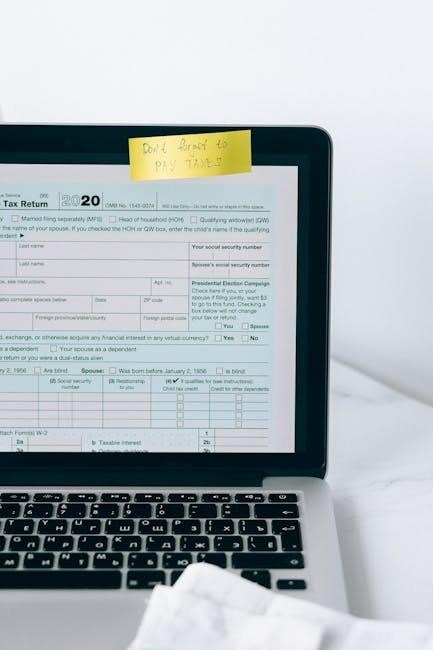Year 4 comprehension worksheets are essential tools for improving reading skills. These PDF resources include engaging texts, questions, and answers, designed to enhance understanding and critical thinking abilities in students.
1.1 Importance of Reading Comprehension for Year 4 Students
Reading comprehension is a cornerstone skill for Year 4 students, fostering their ability to understand and interpret texts. It enhances vocabulary, critical thinking, and the capacity to extract meaning from various passages. Developing strong comprehension skills at this stage builds a solid foundation for future academic success, enabling students to engage confidently with more complex texts. Additionally, it improves communication skills, as students learn to articulate their understanding and ideas effectively. Regular practice with worksheets ensures consistent skill development and prepares students for standardized tests, fostering a lifelong love for reading and learning.
1.2 Benefits of Using PDF Worksheets with Answers
PDF worksheets with answers offer numerous benefits for Year 4 students. They provide convenient access to practice materials, allowing students to work independently at home or in class. The inclusion of answers enables self-assessment, helping students identify strengths and areas for improvement. Immediate feedback fosters a deeper understanding of concepts and reduces reliance on teachers for corrections. Additionally, themed and leveled worksheets cater to diverse learning needs, ensuring engagement and progression. These resources save time for educators, who can focus on teaching rather than creating materials. Overall, PDF worksheets with answers are a practical and effective tool for enhancing reading comprehension skills in Year 4 students.
1.3 Overview of the Structure and Content
Year 4 comprehension worksheets are structured to include a variety of fiction, non-fiction, and poetry texts, each followed by engaging activities. These resources often feature themed passages, skimming exercises, and vocabulary tasks to cater to diverse learning needs. The worksheets are organized into clear sections, with questions ranging from literal to inferential and evaluative. Many include multiple-choice and open-ended questions to assess comprehension skills comprehensively. Answers are typically provided at the end, allowing for easy marking and self-assessment. This structured approach ensures that students are well-prepared for assessments while developing a deeper understanding of texts.

Types of Comprehension Questions in Year 4 Worksheets
Worksheets include literal, inferential, and evaluative questions. Literal questions focus on facts, inferential require deductions, and evaluative ask for opinions or justifications, enhancing critical thinking skills.
2.1 Literal Comprehension Questions
Literal comprehension questions require students to recall specific details from the text. These questions often ask about events, characters, settings, or direct quotes, ensuring a clear understanding of the material. They are straightforward and focus on factual information, making them ideal for assessing basic comprehension skills. In Year 4 worksheets, these questions are typically accompanied by answers to help teachers and students track progress accurately. Regular practice with literal questions builds a strong foundation for more complex comprehension tasks in the future.
2.2 Inferential Comprehension Questions
Inferential comprehension questions challenge students to go beyond the text by making connections, predictions, or deductions. These questions often require students to think critically about the author’s intent, character motivations, or events that aren’t explicitly stated. For example, they might ask, “Why do you think the character acted this way?” or “What might happen next?” Answers are supported by clues from the text but involve personal interpretation. Regular practice with inferential questions helps Year 4 students develop deeper understanding and analytical skills, preparing them for more complex reading tasks.
2.3 Evaluative Comprehension Questions
Evaluative comprehension questions require students to express opinions or judgments about a text. These questions encourage critical thinking and the ability to support opinions with evidence. For example, “Do you agree with the main character’s decision? Why?” or “What do you think is the most important message in this story?” These questions help students develop their ability to analyze and interpret texts, fostering deeper engagement and understanding. Regular practice with evaluative questions prepares Year 4 students to articulate their thoughts clearly and confidently, using textual evidence to justify their opinions.

Themed Worksheets for Year 4 Students
Themed worksheets engage Year 4 students with fiction, non-fiction, and poetry texts, aligning with seasonal events or curriculum topics. These resources make learning relevant and fun, fostering deeper connections to the material while developing comprehension skills through varied and interesting contexts.
3.1 Fiction Texts and Activities
Fiction texts in Year 4 comprehension worksheets captivate students with engaging stories and characters. These activities include reading passages followed by questions that test understanding, inference, and vocabulary. Open-ended and multiple-choice questions encourage critical thinking and creativity. The worksheets often feature themed stories, such as adventures or mysteries, to spark imagination. Accompanying answer keys provide accurate marking and progress tracking for teachers. These resources help students develop a deeper connection to fictional narratives while refining their comprehension skills in an enjoyable and structured manner.
3.2 Non-Fiction Texts and Activities
Non-fiction texts in Year 4 comprehension worksheets expose students to factual information and real-world topics. These activities often include passages about history, science, or geography, followed by questions that test understanding and the ability to extract specific details. Students engage in tasks such as skimming for main ideas, scanning for key facts, and matching words to their synonyms. These exercises help students develop analytical skills and apply knowledge to answer questions accurately. The inclusion of themed non-fiction texts, like historical narratives or fables, makes learning relevant and engaging while reinforcing comprehension strategies.
3.3 Poetry Comprehension Exercises
Poetry comprehension exercises in Year 4 worksheets introduce students to rhythmic and imaginative texts. These activities focus on identifying rhyme schemes, analyzing imagery, and understanding themes. Students engage with questions that ask them to interpret poetic language, identify feelings conveyed, and explain the poet’s intent. Some exercises include identifying rhyming words or discussing the emotions evoked by a poem. These tasks help students develop a deeper appreciation for poetry while enhancing their ability to interpret and form opinions about complex texts. Answer keys are provided for accurate marking and feedback.

Skills Assessed in Year 4 Comprehension Worksheets
Worksheets assess vocabulary, word meaning, and comprehension skills like inference, prediction, and understanding text structure. These exercises help improve both literal and critical thinking abilities in students.
4.1 Vocabulary and Word Meaning
Vocabulary and word meaning are foundational skills assessed in Year 4 comprehension worksheets. Students engage with texts that introduce new words, requiring them to understand context clues and synonym matching. Activities include identifying word meanings, completing sentences, and matching words to definitions. These exercises enhance students’ ability to decode unfamiliar terms and expand their lexicon. Worksheets often provide answer keys, allowing teachers to track progress and provide targeted feedback; By focusing on vocabulary, these resources help students build a stronger foundation for reading comprehension and overall academic success.
4.2 Inference and Prediction Skills
Year 4 comprehension worksheets emphasize the development of inference and prediction skills. Students are encouraged to go beyond the literal meaning of texts, making logical connections and drawing conclusions. Activities include identifying implied meanings, predicting outcomes, and answering open-ended questions. These exercises enhance critical thinking and deepen understanding of narratives and informational passages. Worksheets often feature scenarios or stories that prompt students to speculate about future events or unseen details. By practicing these skills, students improve their ability to engage with texts on a deeper level and develop essential reading comprehension strategies.
4.3 Understanding Text Structure
Year 4 comprehension worksheets help students grasp the organization of texts, including fiction and non-fiction. Activities focus on identifying main ideas, supporting details, and recognizing text patterns like cause-effect or compare-contrast. Students learn to distinguish between headings, paragraphs, and captions, enhancing their ability to navigate and comprehend complex texts. Exercises often involve mapping story structures or outlining informational passages. By mastering text structure, students improve their reading efficiency and ability to locate specific information, which is vital for academic success and independent learning.

Assessment and Progress Tracking
Year 4 comprehension worksheets provide effective tools for assessing reading skills and tracking progress. Answer keys allow accurate marking, helping identify strengths and areas needing support. Monitoring improvement over time ensures tailored instruction and continuous development.
5.1 How Worksheets Help Teachers Assess Students
Year 4 comprehension worksheets provide teachers with a structured method to evaluate students’ reading abilities. The inclusion of diverse texts and activities allows educators to assess a range of skills, from vocabulary understanding to inferential thinking. Answer keys enable accurate marking, ensuring consistency in evaluation. These resources also facilitate progress tracking, as teachers can identify improvements over time. By analyzing student responses, educators can pinpoint strengths and areas requiring additional support. The explicit questions and answers in these worksheets offer a clear framework for assessment, making it easier to monitor individual and class-wide development effectively.
5.2 Using Answer Keys for Accurate Marking
Answer keys in Year 4 comprehension worksheets provide teachers with a reliable tool for accurate marking. These keys include correct answers, ensuring consistency in grading and reducing subjective errors. By aligning student responses with the provided answers, educators can quickly identify areas where students may need additional support. The clarity of answer keys also saves time during marking, allowing teachers to focus on providing detailed feedback. This resource is particularly useful for identifying common misconceptions and tracking progress over time, ultimately enhancing the assessment process and student outcomes.
5.3 Identifying Areas for Improvement
Year 4 comprehension worksheets with answers enable teachers to identify areas where students may need additional support. By analyzing patterns in incorrect answers, educators can pinpoint specific skills requiring reinforcement, such as inference, vocabulary, or text structure understanding. These insights allow for targeted interventions, ensuring students receive focused guidance. Additionally, the clarity of right and wrong answers helps students reflect on their own learning, fostering self-improvement. Regular use of these resources aids in tracking progress and addressing gaps, ultimately enhancing overall reading comprehension abilities and preparing students for advanced challenges.

Popular Resources and Worksheets
Year 4 comprehension worksheets offer a variety of resources, including free PDF downloads, seasonal activity booklets, and leveled stories with exercises to engage students effectively.
6.1 Free PDF Downloads for Year 4 Comprehension
Free PDF downloads for Year 4 comprehension offer a wide range of resources, including fiction, non-fiction, and poetry texts. These worksheets feature engaging passages followed by questions to test understanding. Many PDFs include answer keys, making it easy for teachers and parents to assess progress. Themed activity booklets, such as seasonal and holiday-based exercises, add variety to learning. Additionally, leveled stories with increasing complexity help cater to different reading abilities. These free resources are ideal for classroom use or home learning, providing structured and enjoyable reading comprehension practice for Year 4 students.
6.2 Seasonal and Themed Activity Booklets
Seasonal and themed activity booklets for Year 4 comprehension offer engaging, relevant content tied to holidays and events. These PDF resources feature festive stories, poems, and non-fiction texts, accompanied by comprehension questions. Winter-themed booklets, for example, include snow-related stories, while spring-themed packs focus on nature and growth. These activities keep learning fun and interactive, with varied texts and questions that cater to different reading levels. Many sets include answer keys, making it easier for teachers to assess student progress. Themed booklets are perfect for integrating comprehension practice with seasonal classroom themes or special events.
6.3 Leveled Stories and Exercises
Leveled stories and exercises are tailored to match students’ reading abilities, ensuring gradual skill progression. These resources feature stories that increase in complexity, followed by targeted comprehension questions. Fiction, non-fiction, and poetry texts are included, with exercises that focus on vocabulary, inference, and text structure. Answer keys are provided for accurate assessment. This approach allows teachers to differentiate instruction, catering to individual reading levels. Leveled stories help build confidence and fluency, while exercises reinforce comprehension skills, making them an invaluable tool for Year 4 students and educators alike.

How to Use These Worksheets Effectively
Integrate worksheets into lesson plans, encourage independent practice, and use answer keys for accurate marking. Provide feedback to guide improvement and foster a love for reading.
7.1 Integrating Worksheets into Lesson Plans
Integrate Year 4 comprehension worksheets seamlessly into lesson plans by aligning them with curriculum goals. Use themed texts to match classroom topics, ensuring relevance and engagement. Incorporate worksheets as pre-reading activities to build vocabulary or as post-reading exercises to reinforce understanding. For differentiated instruction, assign leveled stories to cater to varying reading abilities. Encourage collaborative learning by pairing students for discussion before independent practice. Utilize answer keys to provide immediate feedback, highlighting strengths and areas for improvement. Regularly review progress to adjust teaching strategies and ensure comprehension skills are consistently developed throughout the year.
7.2 Encouraging Independent Practice
Encourage independent practice by providing Year 4 students with structured comprehension worksheets. These resources, available in PDF format, allow students to work at their own pace, fostering self-directed learning. Include answer keys for self-assessment, enabling students to identify strengths and areas needing improvement. Offer themed worksheets, such as holiday or animal-themed texts, to maintain engagement. Encourage students to complete exercises independently before reviewing answers, promoting time management and accountability. Regularly track progress to ensure consistent improvement in reading comprehension skills. This approach helps build confidence and reinforces learning effectively.

7.3 Marking and Feedback Strategies
Effective marking and feedback are crucial for improving comprehension skills. Use the provided answer keys to accurately assess student responses, ensuring consistency and fairness. Offer constructive feedback by highlighting correct answers and explaining common misconceptions. Encourage students to review their work, focusing on specific areas for improvement, such as vocabulary or inference skills. Provide verbal or written feedback to guide learning and reinforce understanding. Regularly track progress to identify strengths and weaknesses, tailoring future lessons to address gaps. This structured approach helps students grow confidently in their reading comprehension abilities, fostering a deeper understanding of texts.
Year 4 comprehension worksheets with answers are highly effective for enhancing reading skills and critical thinking. They provide structured support for teachers and students, fostering confidence and a lifelong love for reading.
8.1 Summary of Key Points
Year 4 comprehension worksheets with answers are versatile tools designed to enhance reading skills. These PDF resources include fiction, non-fiction, and poetry texts, along with questions that assess vocabulary, inference, and understanding. The structured format allows teachers to track progress and identify areas needing improvement. Answer keys provide accurate marking, enabling effective feedback. Themed worksheets, such as seasonal or historical topics, engage students and align with curriculum themes. By fostering independent practice and critical thinking, these worksheets play a crucial role in developing confident readers and preparing students for standardized tests.
8.2 Final Thoughts on the Importance of Comprehension Practice
Regular comprehension practice is vital for Year 4 students to build strong reading foundations. These PDF worksheets, complete with answers, offer a structured approach to improving reading skills. By engaging with diverse texts and questions, students enhance their vocabulary, inference abilities, and understanding of text structure. Consistent practice fosters confidence and fluency, essential for academic success. Incorporating these resources into daily routines ensures students are well-prepared for future challenges, making comprehension practice a cornerstone of their educational journey. The availability of answers facilitates self-assessment and teacher feedback, further enriching the learning experience.
8.3 Encouraging a Love for Reading in Year 4 Students
Year 4 comprehension worksheets play a significant role in fostering a lifelong love for reading. By incorporating themed texts, engaging stories, and interactive exercises, these resources captivate students’ interest and make reading enjoyable. The variety of fiction, non-fiction, and poetry texts ensures diverse learning experiences, while the included answers support independent practice and confidence-building. When students are exposed to meaningful and relatable content, they develop a deeper appreciation for reading, transforming it into a source of pleasure and discovery. This enthusiasm lays the foundation for a lifelong love of reading and learning.
